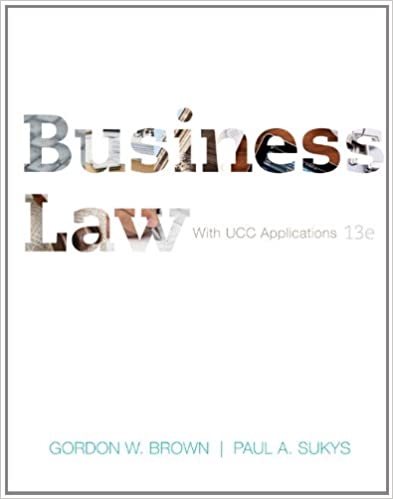
Business Law with UCC Applications 13th Edition by Gordon Brown,Paul Sukys
Edition 13ISBN: 978-0073524955
Business Law with UCC Applications 13th Edition by Gordon Brown,Paul Sukys
Edition 13ISBN: 978-0073524955 Exercise 4
In the case of Stern v. Marshall , Anna Nicole Smith and her stepson, Pierce Marshall, found themselves at odds with one another over the estate of Smith's late husband. The case, or series of cases, involved several disputes, including a probate case concerning the nature of an inter vivos trust that allegedly transferred control of the estate to Smith; a defamation suit filed by Marshall against Smith; Smith's Chapter 11 bankruptcy proceeding; and a counterclaim by Smith against Marshall for tortious interference. When the bankruptcy court came back with a ruling in her favor, Smith attempted to enforce that ruling in the probate court. Marshall responded to Smith's attack with a new series of filings in the probate court. Ultimately the probate court ruled in Marshall's favor. That was when the fun began. The federal bankruptcy court had ruled for Smith and the state probate court had ruled for Marshall. Which court's decision has precedence over the other? Ordinarily, the right answer would be the bankruptcy court because, by virtue of the Supremacy Clause of the Constitution, the federal court rulings trump state court rulings; however, and this is a big however, court cases extending as far back as 1923 have consistently held that bankruptcy courts must follow the final rulings of state courts, rather than the other way around. Also, in a case involving a bankruptcy, we are dealing with a court created by Article I rather than Article III. This makes a difference because both the courts and a federal law [28 USC 157 (b) (2)] have consistently declared that bankruptcy courts cannot make final judgments on "noncore" issues.
A noncore issue does not really involve the approval or disapproval of a creditor's claim. In contrast, when an issue involves a core matter, the bankruptcy court can make a final judgment. Thus, in this case, the final decision turns on whether the counterclaim filed by Smith for tortious interference is a core or a noncore issue. This may not seem serious, but if the counterclaim is a noncore issue, then the power of the bankruptcy courts will be in question and the future of bankruptcy filings in doubt. Is it appropriate to always defer to the federal courts in bankruptcy matters or is it better to also consider states rights? Think about these issues as you explore bankruptcy law and debt adjustment in this chapter. [See Daniel H. Reiss, "Smith Case Could Transform Bankruptcy Litigation," The National Law Journal (February 28, 2011), p. 22. See also: Stern v. Marshall , No. 10-179, United States Supreme Court, argued Jan. 18.]
What is the difference between a bankruptcy court and a probate court? Explain.
A noncore issue does not really involve the approval or disapproval of a creditor's claim. In contrast, when an issue involves a core matter, the bankruptcy court can make a final judgment. Thus, in this case, the final decision turns on whether the counterclaim filed by Smith for tortious interference is a core or a noncore issue. This may not seem serious, but if the counterclaim is a noncore issue, then the power of the bankruptcy courts will be in question and the future of bankruptcy filings in doubt. Is it appropriate to always defer to the federal courts in bankruptcy matters or is it better to also consider states rights? Think about these issues as you explore bankruptcy law and debt adjustment in this chapter. [See Daniel H. Reiss, "Smith Case Could Transform Bankruptcy Litigation," The National Law Journal (February 28, 2011), p. 22. See also: Stern v. Marshall , No. 10-179, United States Supreme Court, argued Jan. 18.]
What is the difference between a bankruptcy court and a probate court? Explain.
Explanation
Bankruptcy and Probate Court
Bankruptcy...
Business Law with UCC Applications 13th Edition by Gordon Brown,Paul Sukys
Why don’t you like this exercise?
Other Minimum 8 character and maximum 255 character
Character 255


